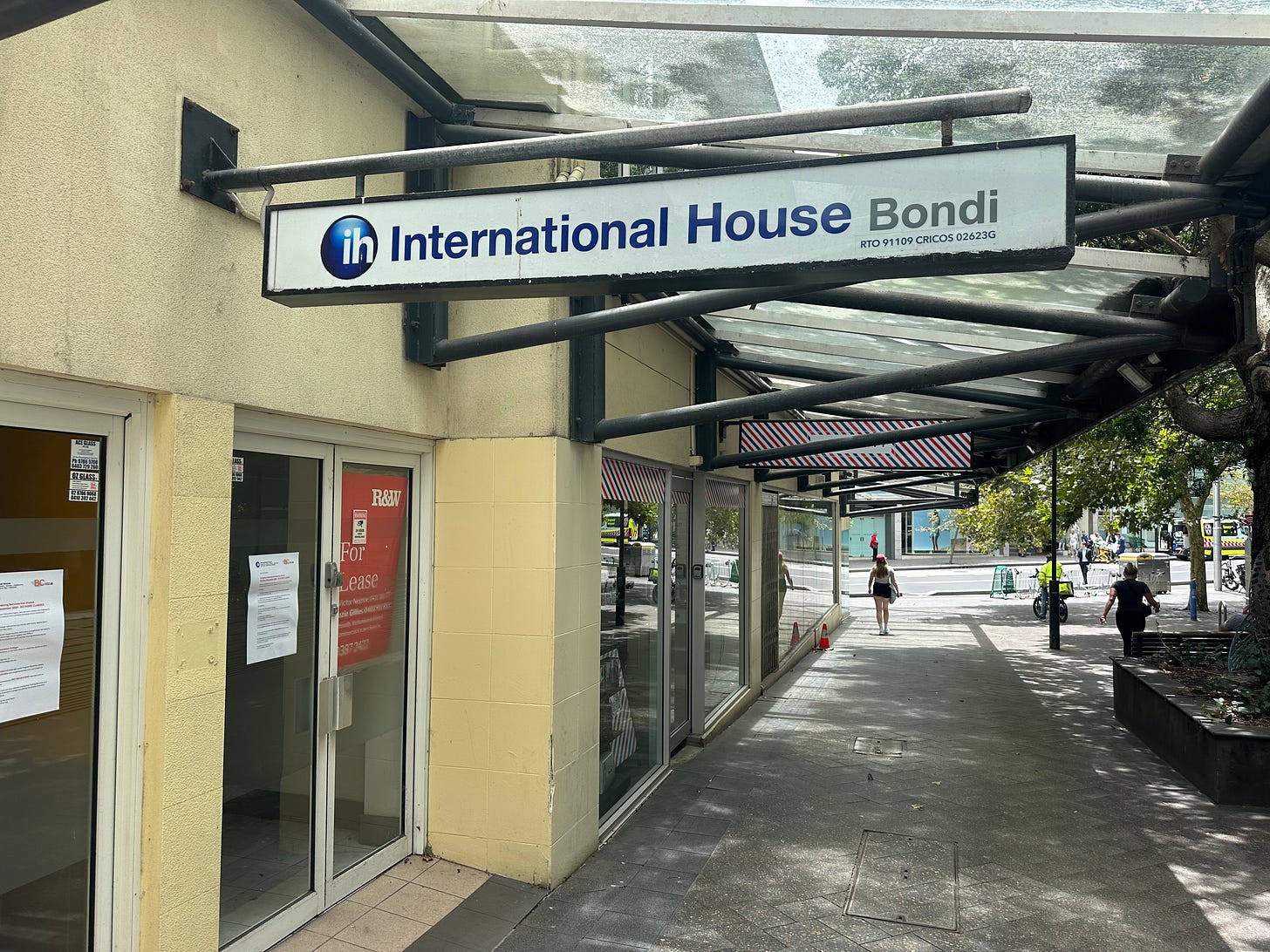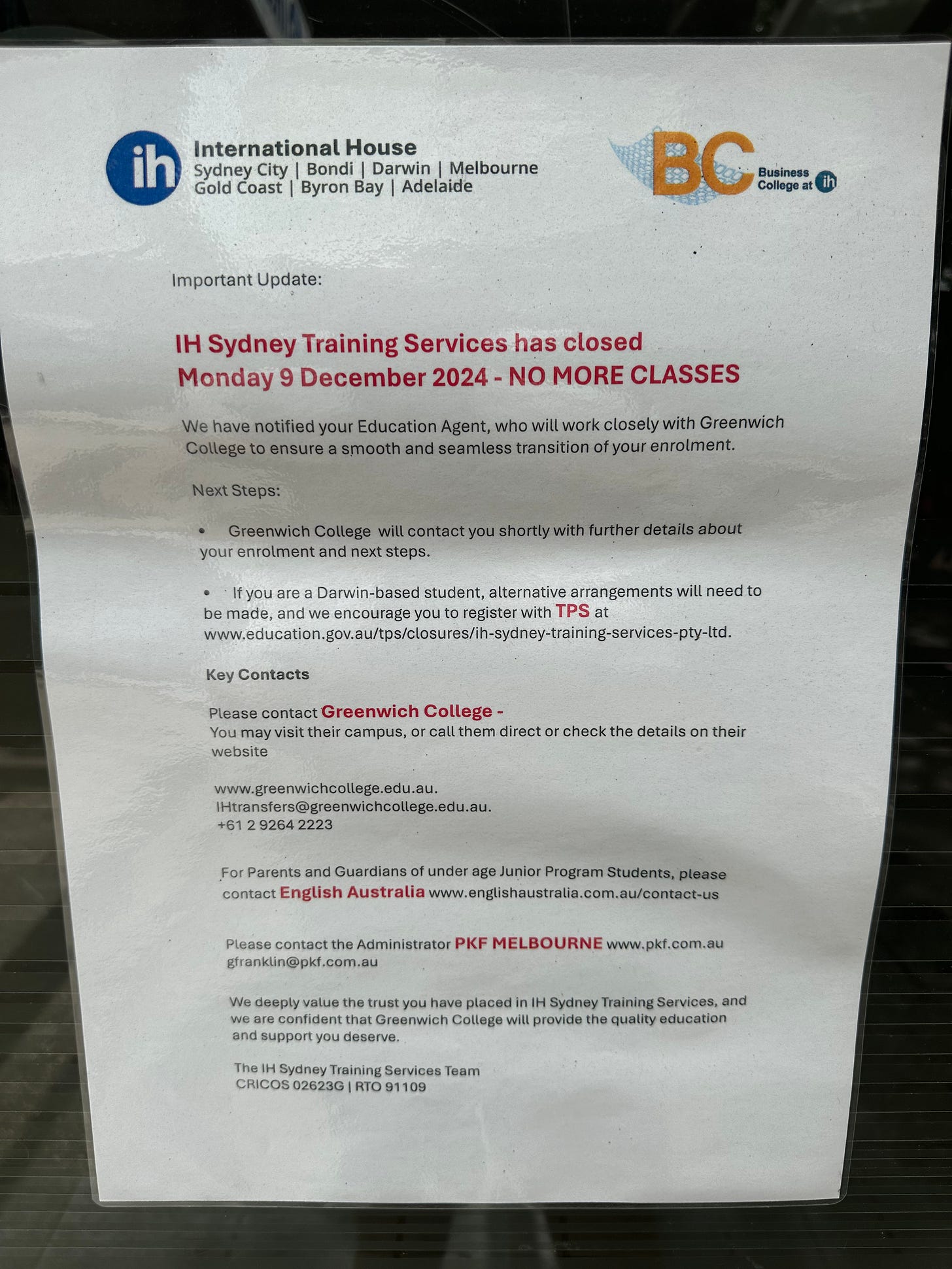Mis-Government
Strike One for Australian Taxpayers, Strike Three for some Australian businesses
Imagine if the government proposed to address Australia’s housing affordability issue by capping the amount of international visitors that could attend tourist destinations around Australia, because we want to limit the amount of people who see how awesome Australia is and would then want to move here. Sounds crazy right? Well, that's exactly what they did in the international education sector.
Australia’s international education sector, the nation’s fourth-largest export industry, has been systematically undermined by short-sighted government policies and mismanagement. The government proposed caps on international students, which the opposition then blocked. In between these two events, chaos ensued.
From mid-2024 thousands of people have been let go and 30,000 jobs have been put at risk (all in a sector that was forced to lose at least 17,300 jobs only a few years ago due to the Pandemic) all for a Bill that is not going to happen (because it was blocked in the Senate) and which would not have addressed the problem it was proposed to solve anyway.
Australian taxpayers have been paying politicians to propose and then block this bill, and are now going to shoulder the burden of all of the people who have lost their jobs as a direct result of this government malfunction. Something seems wrong here..
As the country grapples with the economic aftershocks of the COVID-19 pandemic, the government has tried to introduce measures that not only fail to address pressing issues like housing affordability but actively destabilise a key export industry resulting in needless job loss.
The Group of Eight (Go8) universities suggested the nation could face a reduction of over 22,500 jobs and a $5.3 billion decrease in economic output as a result of this regulation.
The recent collapse of International House is a prime example of the fallout from this mis-governance. International House, a leading provider of English language and vocational training for international students, was a casualty of the very policies that were supposed to safeguard the economy.
Strike One: COVID-19 and the Collapse of the International Education Sector
The COVID-19 pandemic left Australian universities and private education providers reeling.
Over 17,000+ university staff lost their jobs during the pandemic, including casual and full-time staff.
Australian universities relied heavily on international students, who accounted for around 26% of university revenues pre-pandemic. Travel bans and border closures caused international enrolments to drop significantly, leading to an estimated revenue loss of $1.8 billion in 2020 alone. The rest of the pandemic was worse.
International student revenues, which accounted for more than $40 billion annually pre-pandemic, plummeted due to border closures and travel restrictions.
By 2023, two-thirds of Australian universities were operating in deficit.
For institutions like International House, the pandemic drained financial reserves, leaving them vulnerable.
Strike Two: Proposed Caps on International Students
In 2024, the Australian government proposed capping the number of international students.
This policy, however, was widely criticised as both ill-conceived and harmful.
Universities Australia, the peak body representing Australian universities, warned that a reduction of approximately 60,000 international students could lead to an economic loss of $4.3 billion and the potential loss of up to 14,000 jobs in the sector.
The Independent Tertiary Education Council Australia (ITECA) highlighted that government policies, including the proposed cap, risk the livelihood of more than 30,000 Australians employed in the independent tertiary education sector that supports international students.
The rationale was that international students were driving demand for housing, pushing up rental prices in cities like Sydney and Melbourne. Yet, the data shows that international students primarily occupy purpose-built student accommodations or share housing, and their absence during the pandemic caused significant economic downturns in these very areas.
For International House, which relied heavily on international enrolments, the proposed cap was a disaster.
The caps were framed as a solution to a housing affordability crisis, but when 92% of Australian politicians own multiple investment properties, it strikes me that the policymakers do not want housing prices to go anywhere but UP!
Strike Three: Visa Fee Hikes
The government delivered another crushing blow in July 2024 by increasing international student visa application fees from AUD $710 to $1,600 - a 125% hike.
This change disproportionately affected students considering shorter-term English language and vocational courses, the very demographic served by International House.
This fee hike deterred potential students and significantly reduced the flow of international enrolments. International House, unable to fill its classrooms, faced mounting financial pressures. Despite attempts to cut costs by downsizing campuses and reducing staff, the institution could not recover. By December 2024, it entered voluntary administration, leaving thousands of students stranded and hundreds of staff unemployed.
The International House Collapse:
The collapse of International House is emblematic of the broader issues plaguing Australia’s international education sector.
Despite being a respected provider since 1997, International House fell victim to three strikes, all outside its control:
COVID-19 Impact: The pandemic’s toll on international travel decimated its primary revenue stream, draining resources.
Regulatory Uncertainty: The proposed enrolment caps created an unstable operating environment.
Visa Fee Increases: The sharp rise in visa costs further disincentivised students from choosing Australia as their destination and disproportionately affected students considering shorter-term English language and vocational courses, their core market.
Efforts were made to support students in the wake of International House’s closure, with Greenwich College stepping in to honour tuition fees and provide continuity of education.
A Failed Attempt to Address Housing Affordability
The government’s attempt to link international student policies to housing affordability is both disingenuous and ineffective. It is symptomatic of the ongoing power struggle between the Department of Education and the Department of Immigration.
International students are not the primary drivers of Australia’s housing crisis. Instead, I think we should look to unchecked property speculation, negative gearing tax concessions, and policies that favour investors over first-time buyers.
The average Australian politician owns 2.1 properties, with many holding substantial portfolios.
This vested interest in maintaining high property values undermines any genuine effort to tackle housing affordability. By scapegoating international students, the government has avoided addressing the systemic issues that perpetuate the crisis.
In a rare display of unity, the Opposition, which holds a majority in the Senate, blocked the proposed caps on international students.
While this move prevented long term harm, most of the damage had already been done.
International House was an unfortunate casualty and has gone into voluntary administration.
I also have front row seats to the impacts all of this because the agency I started 15 years ago, Global Rev Gen, works for 32 out of Australia’s 42 Universities, helping them recruit international student. As I wrote a few months ago GRG has had many strikes and many strokes over the years but none of them converged to put us out of business. These proposed caps on international students hit us much harder than Covid ever did because, just like International House, we were still in our recovery phase following the pandemic disaster. Will GRG survive? Absolutely, but this has required significant adaptability, resourcefulness, sacrifices and strategic effort on our part.
I’ll say again, thousands have been let go, 30,000 jobs at risk, all in a sector that is recovering from the Pandemic, and all for a proposed bill that is not going to happen - and even it did, would not have addressed the problem it was meant to solve. I pay taxes in Australia, and I am not happy with how they're being spent if this quagmire of government malfunction is what my taxes pay for.
I think the government’s actions amount to nothing less than a betrayal of taxpayers, betrayal of businesses, and betrayal of students.
It’s time for policymakers to prioritise sustainable, evidence-based solutions over performative gestures that serve only to protect their own interests.
Australian businesses, taxpayers and international students who power our economy deserve better.







